Երևան, Հայաստան – Ժամանակակից էներգաարդյունավետության լուծումներով ճարտարապետության օրինակներ տեսնելու նպատակով արտերկիր մեկնելու ժամանակները անցյալում են: Սույն թվականի մայիսի 18 – 22-ին Հայաստանի ամերիկյան համալսարանի Յակոբեան բնապահպանական կենտրոնը ՀՀ էներգետիկայի եվ բնական պաշարների նախարարության հետ համատեղ իրականացրեցին ուսումնական շրջայց Հայաստանում շենքերի էներգաարդյունավետության, վերականգնվող էներգիայի և այլ էկո-լուծումների վերաբերյալ: Ծրագրի մասնակիցների 15 հոգանոց խումբը ներառում էր հանրային ծառայողներ, շինարարներ, գիտական աշխատողների և ՀԿ-ների անդամներ Հայաստանի Սյունիքի մարզից։ Միջոցառման նպատակն էր գիտելիքի ստեղծումը և մինչ այժմ երկրի ներսում ունեցած հաջողություններին նոր ընթացք տալը:
«Առ այսօր Հայաստանում մենք ունենք մի շարք հաջողություններ և լավագույն կիրառումներ կապված կառուցված միջավայրում էներգաարդյունավետության, վերականգնվող էներգիայի և ընդհանուր էկո-լուծումների հետ: Հաջողություններ, որոնք ճանաչվել են համաշխարհային հավաստագրեր տրամադրող գործակալությունների կողմից»,– նշում է ՀՀ էներգետիկայի և բնական պաշարների փոխնախարար պրն. Հայկ Հարությունյանը:
Ազգային շրջայցի նպատակն է մասնակիցներին ցույց տալ շենքերում էներգաարդյունավետության լուծումների հաջողված իրականացումները կամ փորձերը, ինչպես նաև, օգտագործելով այս ազգային շրջայցը, լրատվամիջոցների օգնությամբ շենքերում էներգաարդյունավետության վերաբերյալ իրազեկման մակարդակի բարձրացումը՝ ազգային և տեղական մասշտաբով: Ուսումնական շրջայցի մասնակիցները նաև այցելեցին ՄԱԿ-ի զարգացման ծրագրի փորձնական շենքեր, Ավետիսյան դպրոցը և Դիլիջանի միջազգային դպրոցը, Գյումրու Կարիտաս վերականգնողական կենտրոն, ինչպես նաև Նուբարաշենի թափոնակուտակիչում կենսագազի հավաքման և այրման կայան:
«Հայաստանի ամերիկյան համալսարանի և առհասարակ համալսարանների դերը պետք լինի հավաքել այս փորձերն ու դասերը և դարձնել դրանք օգտակար և հասանելի հանրության համար»,- նշում է ՀԱՀ Յակոբեան բնապահպանական կենտրոնի տնօրեն պրն. Ալեն Ամիրխանյանը: Ուսումնական շրջայցը կազմակերպվել է ԵՄ Սևծովյան ավազանի շենքերի էներգաարդյունավետության նախագծի շրջանակներում, որի նպատակն է տեղական վարչական կարողությունների ամրապնդման միջոցով ստեղծել ուժեղ ռեգիոնալ գործընկերություն և համագործակցություն Սևծովյան ավազանի երկրների միջև շենքերում էներգաարդյունավետության ոլորտում, որը տեղական և գլոբալ առումով խոշոր բնապահպանական և տնտեսական ազդեցություն ունի:
Ծրագրի կայքէջը՝ այստեղ։
Երևան, 2016թ. նոյեմբերի 11-2016թ.-ի հուլիս ամսվա ընթացքում էլէներգիայի տնտեսմանն ուղղված միջոցառումների արդյունքում հաջողվել է ամռանը սպառված էներգիայի ծավալները նախորդ տարվա նույն ժամանակահատվածի համեմատ կրճատել 34%-ով:
Խնայված էներգիայի ընդհանուր արժեքը կազմել է $4500 (50,102 կվատ): Սա համարժեք է 12,5 տոննայով ածխածնի արտանետումների նվազեցմանը: «Այս քայլն ընդգծում է էներգիայի արդյունավետ կառավարման նշանակությունը: Թեև շենքերում էներգաարդյունավետ տեխնոլոգիաների առկայությունը կարևոր է, սակայն նույնքան կարևոր է՝ ինչպես են շենքերը շահագործվում և կառավարվում»,-նշել է ՀԱՀ փոխնախագահ Պր. Աշոտ Ղազարյանը:
Հուլիս ամսվա ընթացքում դադարեցվել է Փարամազ Ավեդիսէան շենքի արևմտյան թևի դասասենյակների օդորակումը: Փոխարենը շահագործվել են Փարամազ Ավեդիսէան շենքի արևելյան թևի և ՀԱՀ-ի հիմնական մասնաշենքի դասասենյակները: Նաև միջանցքներում և որոշ ընդհանուր օգտագործման տարածքներում նվազեցվել է հովացման աստիճանը՝ առանց հարմարավետության վրա ազդելու:
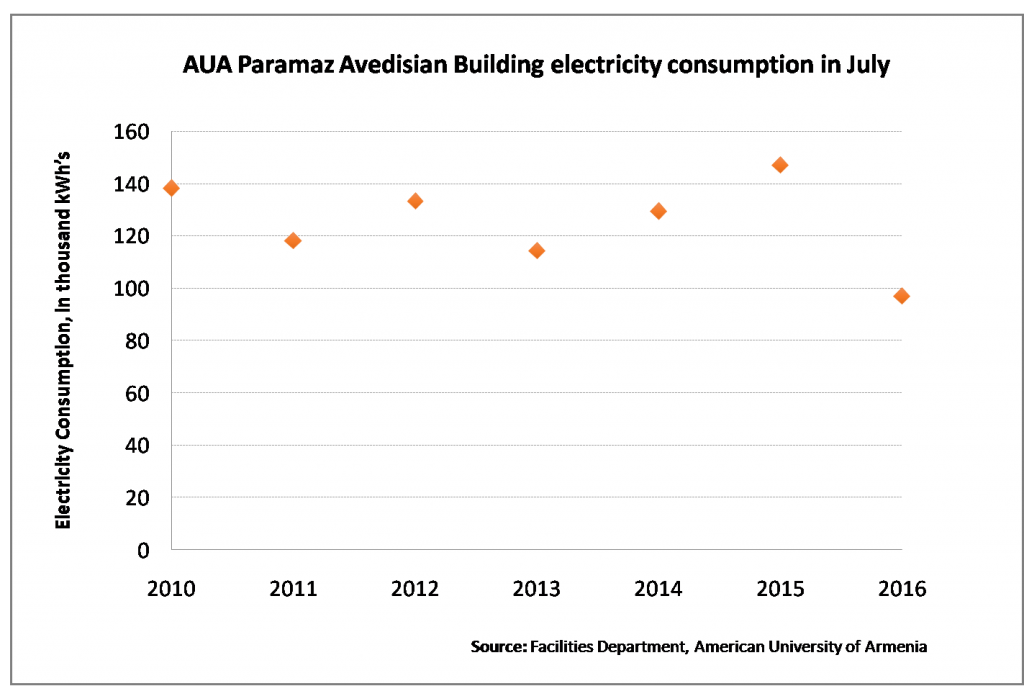
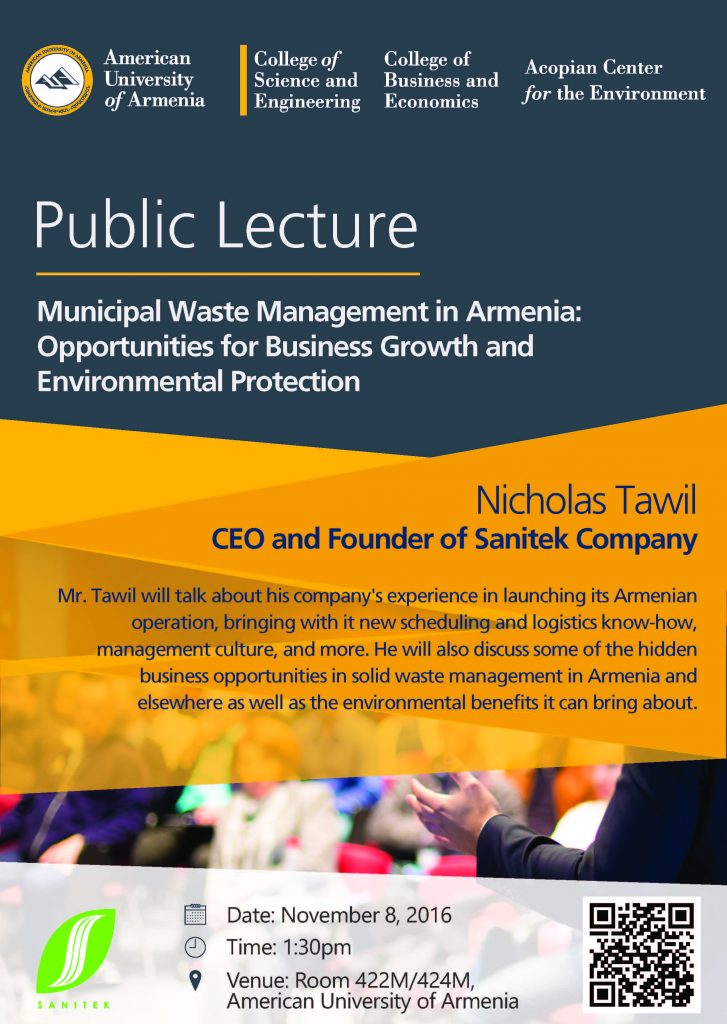
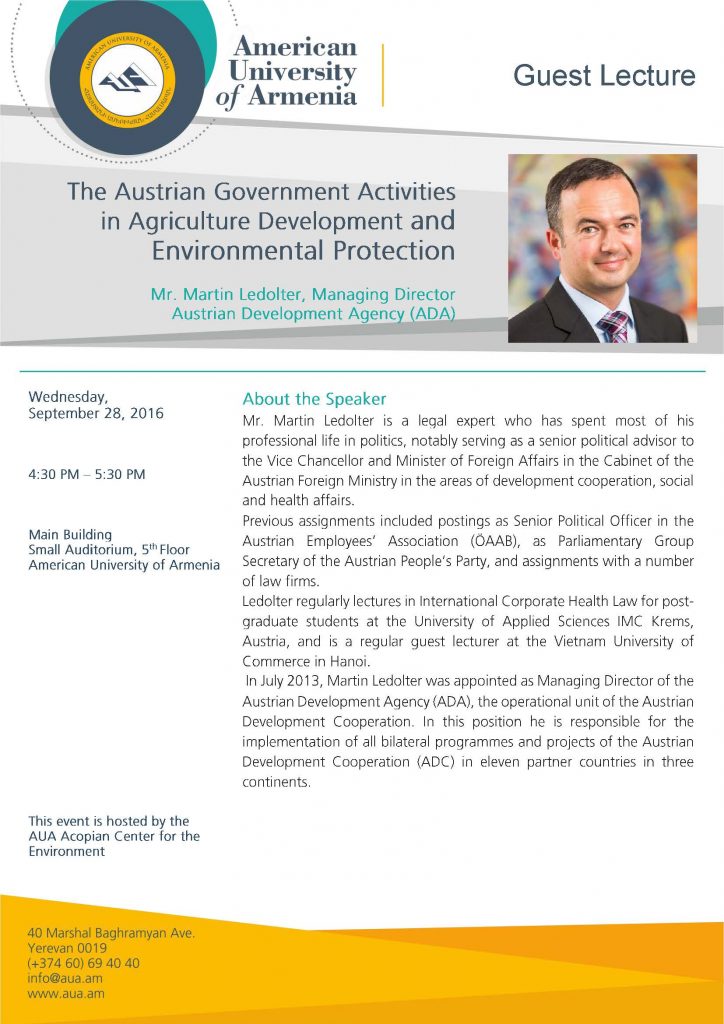
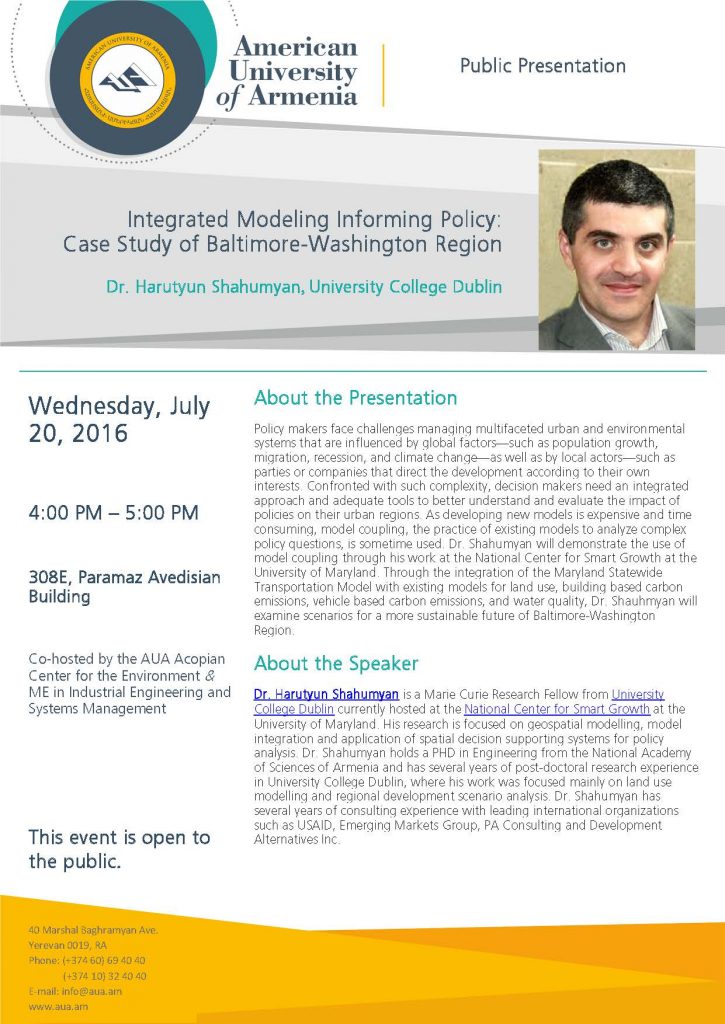
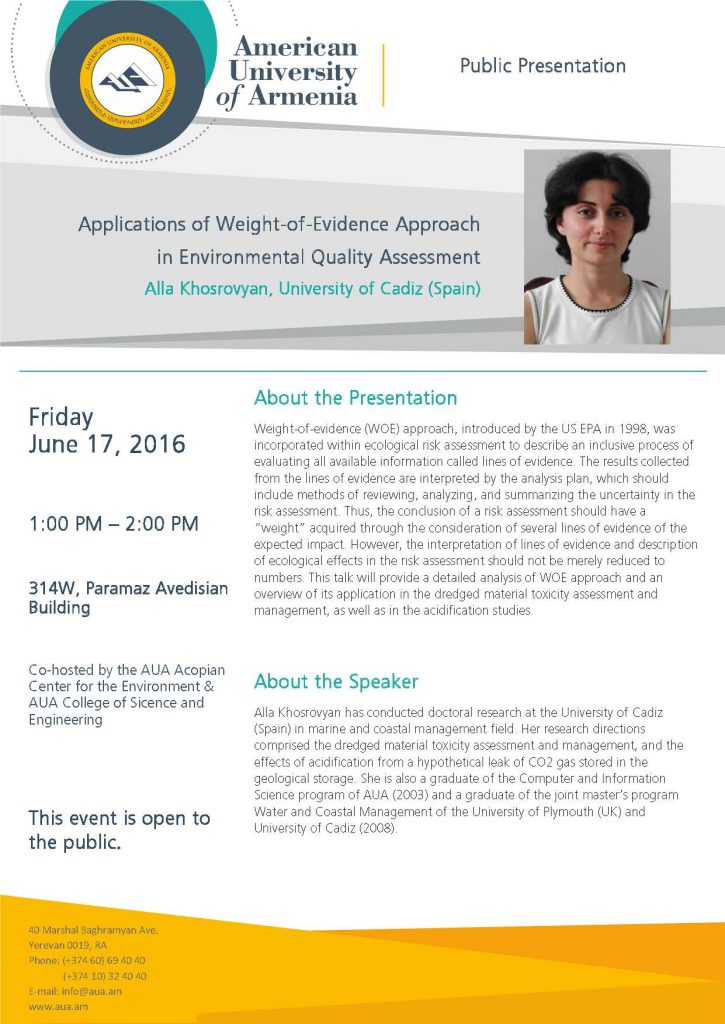
 The aim of establishing the Environmental Education Network (EEN) is to contribute to the efforts of RA Government in promoting and ensuring environmental education at all school levels and at communities. The EEN is a unity of more than fifteen civil society, governmental, educational and international organizations, whose main goal is to contribute to the efforts of Armenia in promoting and ensuring environmental education at all school levels and communities. By having the Memorandum of Understanding signed by all of the EEN members, Armenia undertakes an action of improving the environmental education, with the help of additional knowledge and exchange of experience.
The aim of establishing the Environmental Education Network (EEN) is to contribute to the efforts of RA Government in promoting and ensuring environmental education at all school levels and at communities. The EEN is a unity of more than fifteen civil society, governmental, educational and international organizations, whose main goal is to contribute to the efforts of Armenia in promoting and ensuring environmental education at all school levels and communities. By having the Memorandum of Understanding signed by all of the EEN members, Armenia undertakes an action of improving the environmental education, with the help of additional knowledge and exchange of experience.
The activities of EEN are fully in line with the Government of Armenia’s 2011-2015 National Plan on Establishment of a Universal and Integrated National System for Environmental Education, Upbringing and Awareness and with the Agreement on Cooperation among the Ministry of Education and Science, the Ministry of Territorial Administration and The Deutsche Gesellschaft fur Internationale Zusammenarbeit (GIZ) Country Office in Armenia on the Integration of Environmental Education into Secondary School System of the Republic of Armenia as well as with the UN Decade of Education for Sustainable Development (2005-2014) strategy.
In addition to the previously mentioned advantages, the establishment of EEN promises a potential for further improvement, which firstly implies growth of the number of the contributing parties.
The creation of EEN has been supported by the Norwegian Embassy Small Grants Program 2014, European Union supported civic society capacity building program of the UNDP GEF Small Grants Program, UNICEF, GIZ, WWF and OSCE.
Below are the founding members of EEN:
Part 1. Fundamentals of Armenia’s Education System
Tuesday, Feb 10, 18:15-19:30
TOPIC: Curricular Principles of Armenia’s K-12 Education. SPEAKER: Melanya Davtyan, National Institute of Education, RA Ministry of Science and Education
Tuesday, Feb 17, 18:15-19:30
TOPIC: Armenian Legislation and K-12 Education. SPEAKER: Karen Melkonyan, Teachers’ Professional Development Division, Education Projects PIU, RA Ministry of Science and Education
Part 2. Existing situation and gaps in Armenia’s education system with respect to EE and ESD. Also learning from national and international best practices.
Tuesday, March 17, 16:00-18:00
TOPIC: EE & ESD: International Experience with Effective EE and ESD in K-12 Education. SPEAKER: Being finalized
Tuesday, March 31, 16:00-18:00
TOPIC: Armenia’s integration of EE and ESD in K-12 Education. SPEAKER: Being finalized
Tuesday, April 14, 16:00-18:00
TOPIC: Role of Civil Society in EE and ESD Policy, Curriculum Development and Delivery. SPEAKERS: Being finalized
Part 3. Recommendations for greater integration of EE and ESD in Armenia educational system
Tuesday, April 28, 16:00-18:00
TOPIC: Armenia’s Legislative Gaps and Directions Forward with Respect to EE and ESD. SPEAKER: Karen Melkonyan, Teachers’ Professional Development Division, Education Projects PIU, RA Ministry of Science and Education
Tuesday, May 5, 16:00-18:00
TOPIC: NEXT STEPS: Enhancing the role of EE and ESD in Armenia’s K-12 Education. SPEAKER: Melanya Davtyan, National Institute of Education, RA Ministry of Science and Education
Instructor: Arthur Dolmajian
Class Schedule: MWF, 18:00 – 21:00, May 23 – June 10
Pre-requisites: None
NOTE: This course satisfies the AUA graduate degree environmental requirement
Course Description: The course aims to introduce and develop introductory and intermediate skills in application of Geographic Information Systems (GIS) to visualize, analyse, and interpret relationships, patterns, and trends in the fields of environmental and public health as well as sustainable agriculture and transportation. GIS as a tool, however, is applicable to a wide variety of fields and industries, including marketing, logistics, urban development, and so on.
Forty (40) seats available. Open to AUA and non-AUA community:
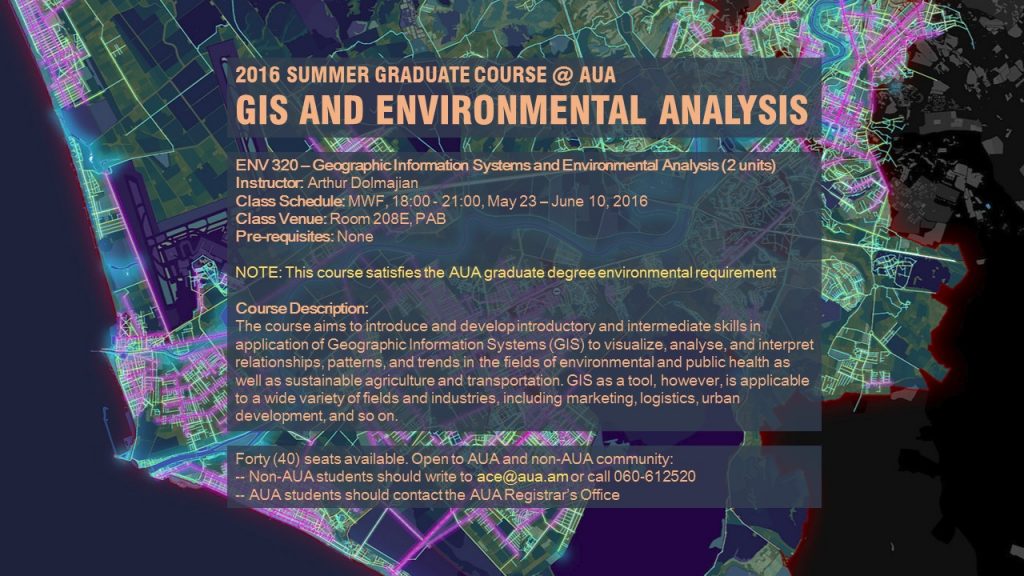
80 ուսանողներ մտքեր փոխանակեցին Երևանի «Կայուն էներգետիկ զարգացման գործողությունների ծրագրի» շուրջ (ԿԷԶԳԾ)
Հինգ համալսարաններ ներկայացնող ավելի քան 80 ուսանողներ հավաքվել էին Հայաստանի ամերիկյան համալսարանում (ՀԱՀ)՝ քննարկելու Երևանի «Կայուն էներգետիկ զարգացման գործողությունների ծրագիրը», որը սահմանում է այն ուղիները, որոնց միջոցով քաղաքապետարանը կկարողանա 20 տոկոսով կրճատել էներգիայի սպառումը և ածխածնի արտանետումները 2020թ-ի դրությամբ։ Ուսանողների մտքերը հաշվի են առնվել Երևանի ԿԵԶԳԾ-ում, որը հաստատվել է քաղաքի ավագանու կողմից և ներկայացվել է ԵՄ Քաղաքապետերի դաշնագրին։ Երևանը Հայաստանի այն 13 քաղաքներից է, որոնք միացել էն կլիմայի և էներգիայի վերաբերյալ ԵՄ Քաղաքապետերի դաշնագրին և այն 7 հայկական քաղաքներից մեկն է, որն արդեն ներկայացրել է իր ԿԵԶԳԾ-ն։ Երևանի ԿԵԶԳԾ-ի մշակման աշխատանքները ղեկավարում էր «Էներգախնայողության աջակցման հիմնադրամի» (ESF-Հայաստան) հիմնադիր տնօրեն, մեր գործընկեր Աստղինե Պասոյանը։ Երևանի ԿԵԶԳԾ-ի պատրաստման աշխատանքները ֆինանսավորվել են ՄԱԿ-ի զարգացման ծրագրի հայաստանյան գրասենյակի կողմից։
80 University Students Discuss Yerevan’s Sustainable Energy Action Plan (SEAP)
More than 80 students from 5 universities gathered at AUA to discuss Yerevan’s Sustainable Energy Action Plan (SEAP), which identifies ways in which the municipality can reduce its energy use and carbon emissions by 20% by the year 2020. Input from students was used in the final draft of the Yerevan SEAP, which has been approved by Yerevan Municipality’s Council of Elders and submitted to the EU Covenant of Mayors. Yerevan is one of the 13 Armenian cities joining the Covenant of Mayors and one of the 7 in Armenia to have submitted its SEAP. Leading the development of the Yerevan SEAP was our adjunct faculty member, Ms. Astghine Pasoyan, in her capacity as the founder and director of the Foundation to Save Energy. Preparation of the Yerevan SEAP was funded by the United Nations Development Programme in Armenia.
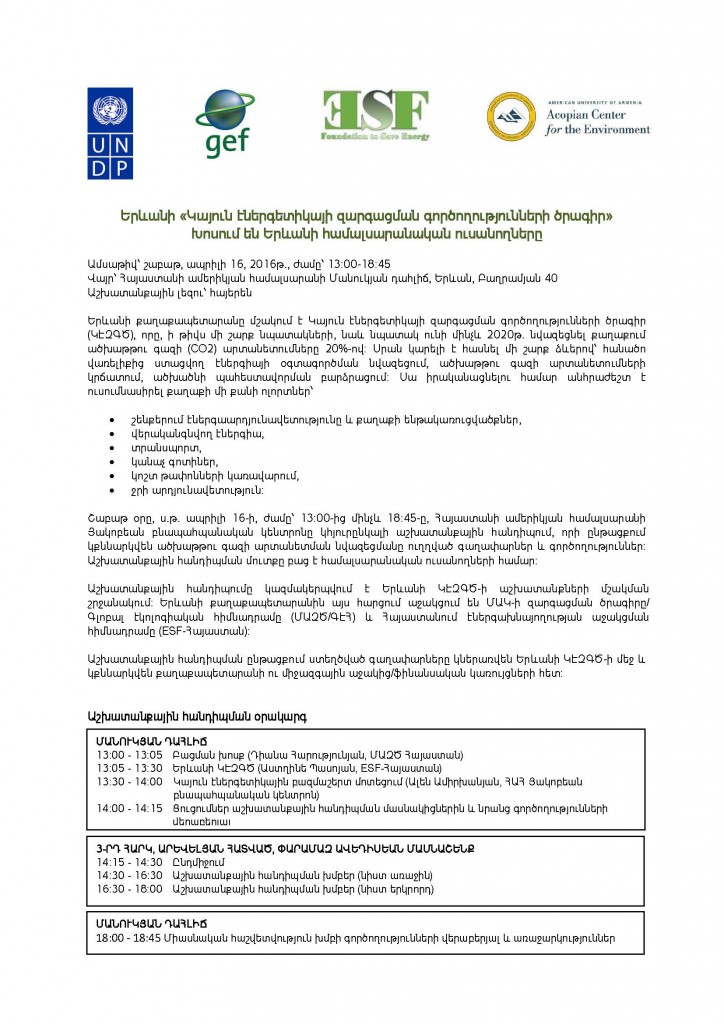
Միջազգային կազմակերպություններ
Ազգային կազմակերպություններ
Reintroduction of the Brown Trout in Armenia’s Rivers Studied by AUA Acopian Center for the Environment
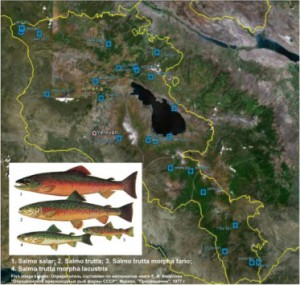 Overfishing in the 1990s has led to a collapse of Brown Trout (Salmo trutta morpha fario) stocks throughout Armenia. This species, once available abundantly in all of Armenia’s provinces, is currently found in fewer than 20% of surveyed rivers. To determine the suitability for its reintroduction, the AUA Acopian Center for the Environment with support from GIZ, the German Organization for International Cooperation, has conducted an extensive survey of physical and chemical properties of 22 rivers and streams in 7 provinces of Armenia.
Overfishing in the 1990s has led to a collapse of Brown Trout (Salmo trutta morpha fario) stocks throughout Armenia. This species, once available abundantly in all of Armenia’s provinces, is currently found in fewer than 20% of surveyed rivers. To determine the suitability for its reintroduction, the AUA Acopian Center for the Environment with support from GIZ, the German Organization for International Cooperation, has conducted an extensive survey of physical and chemical properties of 22 rivers and streams in 7 provinces of Armenia.
“The results of the survey are promising,” says Dr. Karen Aghababyan, chief scientist of the AUA Acopian Center and the study’s principal investigator. “Most rivers studied are suitable for reintroduction of the species. Their oxygen and pH levels were within the range preferred by the Brown Trout, and most sites had appropriate levels of ammonia and carbon dioxide, as well as enough benthic invertebrates to serve as food for the reintroduced fish,” explains Dr. Aghababyan.
In addition to scouting river sites, the AUA Acopian Center researchers found an appropriate brood stock with which to populate the rivers in question. To this end, the Center has collaborated with a fish farm that had Brown Trout captured wild in the Arpa River in 2009. This trout, which has not interbred with other fish species and has not gone through artificial selection, caries all the genes of the wild population and is suitable for introduction into the native stocks.
For many decades, the Brown Trout has been a staple fish in diets worldwide. In most parts of the world, Brown Trout is interbred with local populations, resulting in fish that is genetically different from their ancestors. Very few places on Earth are home to genetically pure Brown Trout. Armenia is one of these places, its mountainous rivers providing protection from interbreeding with non-indigenous species.
A successful reintroduction of a fish species needs more than adequate water conditions and pure breed. “We also need to ensure that the site is protected from poachers. Communities close to these fish populations have to have economic incentive to protect them. Local stewardship of the fish stock has to be worked into the reintroduction,” says Dr. Aghababyan.
Batumi Raptor Count and AUA Acopian Center Continue to Partner
AUA Acopian Center for the Environment continues its cooperation with the Batumi Raptor Count (BRC) by developing and delivering environmental education programs to youth from all parts of the Caucasus. This year, Hasmik Ter-Voskanyan (in August) and Siranush Tumanyan (in September) led youth groups, including some from Armenia.
In early September, Dr. Karen Aghababyan, AUA Acopian Center chief scientist, attended the International Batumi Bird Festival organized by BRC. During his visit, Dr. Aghababyan discussed opportunities for expanding cooperation between the organizations through development of nature-based tourism as well as strengthening environmental-education and bird-monitoring programs.
“This is a relationship we want to develop further,” says Alen Amirkhanian, director of the AUA Acopian Center. “Batumi provides an unparalleled setting in the Caucasus to educate and conduct research on the environment. Importantly we are able to do this jointly with people from all parts of the Caucasus and Europe. Developing this type of cooperation is essential for addressing environmental protection needs,” says Amirkhanian.
BRC is a vital nature conservation program in the region. It monitors the more than 850,000 birds of prey that migrate through the “Batumi Bottleneck” every fall. It also works to protect the birds from illegal shootings and trappings, practices that continue to this day.
Batumi is a Black Sea coastal city in the Ajara region of the Republic of Georgia.
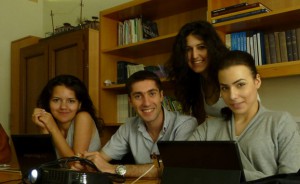 The AUA Acopian Center for the Environment, in cooperation with the UK-based Fauna and Flora International (FFI), has launched a baseline study to better understand human-wildlife conflicts and approaches to mitigating them.
The AUA Acopian Center for the Environment, in cooperation with the UK-based Fauna and Flora International (FFI), has launched a baseline study to better understand human-wildlife conflicts and approaches to mitigating them.
The abundance of livestock and other foodstuff, coupled with proximity to wildlife habitats, makes villages vulnerable to animals like wolves and bears. Often the threat is not physically against humans but against their economic assets. Wolves kill sheep, cows, and fowl, while bears damage fruit trees, destroy beehives, and deplete honey supplies. Over time these can take a heavy economic toll on villages that are surviving on meager means.
Before suffering heavy economic damage, however, villagers typically resort to killing the wolves or the bears, dealing a blow to an already tattered ecosystem. According to official statistics, 170 wolves have been killed during just three months of 2012.
FFI has been involved in human-wildlife conflict mitigation projects for many years, working extensively in Southeast Asia, Eastern Europe and, most recently, in the Republic of Georgia. Through a program that combines direct intervention, raising awareness, and market-based innovation, the FFI initiative has seen a marked improvement in the attitudes of livestock farmers towards wolves.
The AUA ACE researchers, all AUA students, are led by Dr. Karen Aghababyan, AUA ACE chief scientist, in studying nine rural communities across Armenia as well as the habitat conditions of the wildlife.
The project, expected to be completed by end of this year, will not only give students the opportunity to gain hands-on experience in the field, but will also contribute to finding solutions to preserving biodiversity while ensuring economic wellbeing in rural communities.
Տևողություն՝ հուլիս, 2013 – հունիս 2015
Հայաստանի ամերիկյան համալսարանը հանդիսանում է WASTEnet Սևծովյան ցանցի գործընկեր, որը «BLACK SEA BASIN 2007-2013» ծրագրի շրջանակներում խթանում է կենցաղային կեղտաջրերի բնական մաքրման համակարգերի ներդնումը:
Ծրագրի նպատակն է շահադրդել սևծովյան մասնակից երկրների տեղական և տարածաշրջանային կառավարման մարմիններին ստեղծել և կիրառել կենցաղային կեղտաջրերի մաքրման բնական համակարգեր: Սա կկատարվի շրջակա միջավայրի պահպանությանն ուղղված ռեսուրների և հմտությունների փոխանակման, ինչպես նաև թափոնների և կենցաղային կեղտաջրերի մաքրման բնական համակարգերի կառավարման և տեխնոլոգիաների նորարարական լուծումներին ուղղված համագրոծակցության խթանմամբ:
Սկիզբ՝ հուլիսի 1, 2013
Ավարտ՝ հունիսի 30, 2015
Այցելեք ծրագրի կայքը՝ http://www.waste-net.info/
If you are a participant of the 1st “International Scientific Conference on “Sustainable Solutions to Wastewater Management”, please visit here for more information about accommodation.
The overall aim of the SUAFRI-EPC project is to bridge the gap between Agri-Food research and innovation in Eastern Partnering Countries (EPC) by bringing together all actors of the knowledge value chain and raising their awareness on how to uptake research results into innovation. SUAFRI-EPC is supporting the Agri-Food sector and community in EPC by developing the basis for an efficient “Research to Innovation – R2I” process with the support of European partnering specialists.
The project will consist in the following activities:
The SUAFRI-EPC project aims also to cooperate with other European projects and initiatives targeting EPC countries, under ‘Cluster joint activities’. Cluster activities will consist in organising and contributing to joint events, exchange of information, and support current projects targeting EPC countries.
This pilot project aims to develop new production methods in aquaculture and apiculture in order to optimize production costs and increase environmental sustainability. It will be implemented via training and exchange of experts between the American University of Armenia (AUA) and the Danish company Dianova.
During the first year, the activities will be focused on the topic of sustainable aquaculture. The Danish experts will organize a number of training sessions on water recirculation systems, monitoring of effluents from aquaculture facilities, disease monitoring and control systems, and quality parameters.
During the second year, the team will continue its work on aquaculture but will also exchange on apiculture topic related to the production of honey. The interest of AUA is to learn more on the formalization of existing practices on prevention of bee diseases; and the creation of guideline for honey processing.
Related articles: http://newsroom.aua.am/2014/10/19/acopian-center-works-with-danish-consultants-on-aquaculture/
Visit Project Website: http://suafri-epc.eu/
Young architects and graphic designers are invited to submit designs for the cover of this textbook. The cover includes front cover, cover spine, and back cover. Download Detailed Instructions here.
«Շենքերի էներգետիկ արդյունավետության բարձրացում» ՄԱԶԾ-ԳԷՖ ծրագրի շրջանակներում հրատարակվելու է դասագիրք ճարտարապետության և քաղաքաշինության գծով մասնագիտացող ուսանողների համար՝ շրջակա միջավայրի հետ համահունչ և էներգաարդյունավետյան տեսանկյունից արդյունավետ շինությունների դիզայնի վերաբերյալ: Գրքի գլխավոր հեղինակը հանդիսանում է ՀԱՀ Յակոբեան բնապահպանական կենտրոնի տնօրեն Ալեն Ամիրխանյանը:
Երիտասարդ ճարտարապետները և գրաֆիկական դիզայներները հրավիրվում են ներկայացնելու իրենց առաջարկները դասագրքի շապիկի ձևավորման վերաբերյալ: Շապիկը ներառում է առջևի կազմը, ամրացման եղանակը, և հետևի կազմը: Մանրամասն ուղեցույցը ներբեռնելու համար սեղմեք այստեղ:
Սկսած 2016թ.-ից՝ ՀԱՀ-ը բակալավրի ուսանողների համար առաջարկում է նոր «Բնապահպանական ծրագրեր» կոչվող առարկա։ Բարձր կուրսերի համար նախատեսված այս դասընթացը պատրաստված է այնպես, որ ուսանողները ձեռք բերեն ավելի խորը ընկալումներ և կարողություններ բնապահպանական ծրագրերի նախագծման, իրականացման և գնահատման վերաբերյալ։
Ծրագրերը կարող են լինել տեխնոլոգիաների, բնագիտության, պահպանման, կառավարման, վերականգնման, գովազդի կամ մարկետինգի, կրթության և այլ հարակից ոլորտներում։
Դասընթացը շեշտը դնում է տվյալների հավաքագրման և վերլուծության վրա՝ նպատակ ունենալով գնահատել ծրագրի գաղափարների հաջողության և ազդեցության աստիճանը։ Դասընթացի ժամանակ ուսանողները կնախագծեն ծրագիր և կիրականացնեն այն։ Բնապահպանական ծրագրերի տեսակները կտարբերվեն՝ կախված ուսանողների և դասախոսական կազմի միջև համաձայնությունից։
Ծրագրերը կարող են նաև առնչություն ունենալ հետևյալ թեմաների հետ․ Մաքուր տեխնոլոգիաներ, ՏՏ, արբանյակային, հեռահար զոնդավորման լուծումներ շրջակա միջավայրի պաշտպանության հարցում, այլընտրանքային տրանսպորտ, մաքուր տրանսպորտ, վերականգնվող էներգիայի արտադրություն և էներգաարդյունավետություն, ջրի կայուն օգտագործում, կոշտ թափոնների կառավարում, կայուն գյուղատնտեսություն և սննդի արտադրություն, հանքարդյունաբերական աղտոտման կանխարգելում և կառավարում, անտառների պաշտպանություն, կառավարում և վերականգնում, գետավազանի պաշտպանություն, կառավարում և վերականգնում, օդի որակի պաշտպանություն, կառավարում և վերականգնում, բուսական և կենդանական աշխարհի մշտադիտարկում, պահպանություն և վերականգնում։